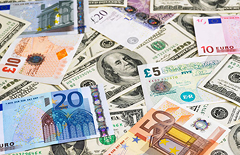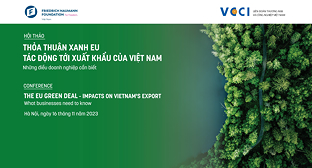U.S. to Levy Countervailing Duties against Undervalued Currencies?
07/06/2019 12:00

U.S. Department of Commerce Releases Notice of Proposed Rulemaking
According to a Notice of Proposed Rulemaking (the “NPR”) issued by the United States Department of Commerce (“Commerce”) and published in the Federal Register on May 28, 2019,[1] Commerce is preparing to levy tariff duties on exports to the United States from mercantilist countries that artificially undervalue their currencies to tip the balance of trade to their advantage.
Under the proposed rule, two regulations would be modified—one clarifying how Commerce determines whether foreign exporters to the U.S. obtain a “benefit” from their home country’s currency manipulation and one clarifying that such companies as a class can constitute a group of enterprises for purposes of determining whether a subsidy is “specific.”
Commerce imposes duties on subsidized goods imported into the U.S., to offset or “countervail” the benefit that the subsidies give to foreign exporters. In practice, there is an extensive range of subsidies that foreign governments provide to unfairly benefit foreign exporters to the United States: e.g., preferential land grants, export credits, policy lending and even preferential rates on public utilities such as electricity. Generally, when a U.S. enterprise files a petition for relief from a foreign subsidy, Commerce will investigate to determine whether a foreign government or public agency has provided a countervailable subsidy. If so, Commerce may be able to instruct U.S. Customs and Border Protection to apply countervailing duties on the subject imports.
U.S. industries have long alleged that currency undervaluation under certain unified currency regimes constituted a countervailable subsidy, but Commerce has never found the evidence of such claims to be sufficient to warrant initiating an investigation. Indeed, neither the Tariff Act of 1930 (the “Act”) nor Commerce’s regulations specify how to determine the existence of a benefit arising out of currency-undervaluation policies. However, against the backdrop of U.S. President Donald Trump’s longstanding pledge to declare China a “currency manipulator,” Commerce is evidently proposing the modifications described in the NPR to fill this void.
The first proposed change focuses on determining whether a subsidy is “specific” enough to be countervailable. To be eligible for a countervailing duty, a subsidy must be “specific,” meaning it is a special limited benefit that a foreign government preferentially provides to a particular class of enterprise or industry located within its territory.[2] The first proposed modification in the NPR would recognize the “class” of enterprises that primarily sell goods in international trade as a “class of enterprises or industries” for purposes of determining specificity. If exporters from a country that has artificially devalued its currency collectively account for a disproportionate share of net foreign exchange transactions in such country, Commerce could find a currency-undervaluation subsidy to be “specific” to such exporters.
The second proposed change addresses how Commerce could determine the existence and extent of the benefit from a currency-undervaluation subsidy. The NPR describes one method Commerce could employ involving the concept of an equilibrium “real effective exchange rate” (“REER”) consistent with International Monetary Fund (“IMF”) methodologies. To determine the value of the countervailable benefit to a particular enterprise, Commerce would take into account the amount of U.S. dollars that enterprise converted into domestic currency during the relevant investigation or review period, the actual exchange rates in effect at the time of conversion, and the exchange rate consistent with the equilibrium REER that would have prevailed in the relevant period absent the artificial undervaluation.[3]
Commerce suggests that the expected impact of the proposed rule changes would be surprisingly low, estimating that they would generate between US$3.9 million to US$16.9 million in additional countervailing duties collected each year. Compared to the staggering US$419-billion trade deficit that the U.S. ran with China alone in 2018, several million dollars’ worth of countervailing duties levied worldwide appears insignificant. The estimated duties are so slight because countervailing duties cannot be applied across the board against all imports from a subsidizing country; duties only apply to the specific goods named in a petition filed with Commerce. Typically, because of the high cost for U.S. enterprises to file and prosecute petitions for relief, petitions are only filed if there are numerous subsidies in play.
Therefore, Commerce predicts that adding currency undervaluation to the list of subsidies is not likely to cause an appreciable increase in the number of petitions filed. In practice, the only change resulting from the new rules may be the addition of currency-undervaluation claims in petitions that would have been filed regardless of the changes to the rule.
Furthermore, the changes to the rule would not lead to any additional countervailing duties being levied unless Treasury finds there has been currency devaluation as a result of government manipulation of the exchange rate. Despite its mandate under the 1988 Omnibus Trade and
Competitiveness Act to prepare semi-annual reports on “Macroeconomic and Foreign Exchange Policies of Major Trading Partners of the United States,” Treasury has not labeled a trading partner a currency manipulator since 1994, and because of complicated policy considerations that extend beyond the realm of trade and tariffs, it is uncertain when, if ever, Treasury will next do so. Earlier this week, Treasury released its semi-annual currency report.
Once again, it declined to name China or any other country a currency manipulator, but it did name China and eight other nations as “countries of interest” for further monitoring.
This remains a situation to watch. If the new rules are adopted as proposed, the result could be increased tension and higher stakes in the pitched battle currently raging between the U.S. and its trading partners around the globe.
The public comment period for the proposed rule is open until June 27, 2019. KWM will be monitoring the public comment letters for important developments.
According to a Notice of Proposed Rulemaking (the “NPR”) issued by the United States Department of Commerce (“Commerce”) and published in the Federal Register on May 28, 2019,[1] Commerce is preparing to levy tariff duties on exports to the United States from mercantilist countries that artificially undervalue their currencies to tip the balance of trade to their advantage.
Under the proposed rule, two regulations would be modified—one clarifying how Commerce determines whether foreign exporters to the U.S. obtain a “benefit” from their home country’s currency manipulation and one clarifying that such companies as a class can constitute a group of enterprises for purposes of determining whether a subsidy is “specific.”
Commerce imposes duties on subsidized goods imported into the U.S., to offset or “countervail” the benefit that the subsidies give to foreign exporters. In practice, there is an extensive range of subsidies that foreign governments provide to unfairly benefit foreign exporters to the United States: e.g., preferential land grants, export credits, policy lending and even preferential rates on public utilities such as electricity. Generally, when a U.S. enterprise files a petition for relief from a foreign subsidy, Commerce will investigate to determine whether a foreign government or public agency has provided a countervailable subsidy. If so, Commerce may be able to instruct U.S. Customs and Border Protection to apply countervailing duties on the subject imports.
U.S. industries have long alleged that currency undervaluation under certain unified currency regimes constituted a countervailable subsidy, but Commerce has never found the evidence of such claims to be sufficient to warrant initiating an investigation. Indeed, neither the Tariff Act of 1930 (the “Act”) nor Commerce’s regulations specify how to determine the existence of a benefit arising out of currency-undervaluation policies. However, against the backdrop of U.S. President Donald Trump’s longstanding pledge to declare China a “currency manipulator,” Commerce is evidently proposing the modifications described in the NPR to fill this void.
The first proposed change focuses on determining whether a subsidy is “specific” enough to be countervailable. To be eligible for a countervailing duty, a subsidy must be “specific,” meaning it is a special limited benefit that a foreign government preferentially provides to a particular class of enterprise or industry located within its territory.[2] The first proposed modification in the NPR would recognize the “class” of enterprises that primarily sell goods in international trade as a “class of enterprises or industries” for purposes of determining specificity. If exporters from a country that has artificially devalued its currency collectively account for a disproportionate share of net foreign exchange transactions in such country, Commerce could find a currency-undervaluation subsidy to be “specific” to such exporters.
The second proposed change addresses how Commerce could determine the existence and extent of the benefit from a currency-undervaluation subsidy. The NPR describes one method Commerce could employ involving the concept of an equilibrium “real effective exchange rate” (“REER”) consistent with International Monetary Fund (“IMF”) methodologies. To determine the value of the countervailable benefit to a particular enterprise, Commerce would take into account the amount of U.S. dollars that enterprise converted into domestic currency during the relevant investigation or review period, the actual exchange rates in effect at the time of conversion, and the exchange rate consistent with the equilibrium REER that would have prevailed in the relevant period absent the artificial undervaluation.[3]
Commerce suggests that the expected impact of the proposed rule changes would be surprisingly low, estimating that they would generate between US$3.9 million to US$16.9 million in additional countervailing duties collected each year. Compared to the staggering US$419-billion trade deficit that the U.S. ran with China alone in 2018, several million dollars’ worth of countervailing duties levied worldwide appears insignificant. The estimated duties are so slight because countervailing duties cannot be applied across the board against all imports from a subsidizing country; duties only apply to the specific goods named in a petition filed with Commerce. Typically, because of the high cost for U.S. enterprises to file and prosecute petitions for relief, petitions are only filed if there are numerous subsidies in play.
Therefore, Commerce predicts that adding currency undervaluation to the list of subsidies is not likely to cause an appreciable increase in the number of petitions filed. In practice, the only change resulting from the new rules may be the addition of currency-undervaluation claims in petitions that would have been filed regardless of the changes to the rule.
Furthermore, the changes to the rule would not lead to any additional countervailing duties being levied unless Treasury finds there has been currency devaluation as a result of government manipulation of the exchange rate. Despite its mandate under the 1988 Omnibus Trade and
Competitiveness Act to prepare semi-annual reports on “Macroeconomic and Foreign Exchange Policies of Major Trading Partners of the United States,” Treasury has not labeled a trading partner a currency manipulator since 1994, and because of complicated policy considerations that extend beyond the realm of trade and tariffs, it is uncertain when, if ever, Treasury will next do so. Earlier this week, Treasury released its semi-annual currency report.
Once again, it declined to name China or any other country a currency manipulator, but it did name China and eight other nations as “countries of interest” for further monitoring.
This remains a situation to watch. If the new rules are adopted as proposed, the result could be increased tension and higher stakes in the pitched battle currently raging between the U.S. and its trading partners around the globe.
The public comment period for the proposed rule is open until June 27, 2019. KWM will be monitoring the public comment letters for important developments.
June 3, 2019
Source: Lexology
Source: Lexology
Các tin khác
- Businesses capitalize on recovery momentum to explore market expansion (17/04/2024)
- Canada is second largest consumer of Vietnamese pangasius in CPTPP bloc (17/04/2024)
- India’s tariff removal on several US products benefiting farmers: Katherine Tai (17/04/2024)
- Thailand Contemplates Protective Tariffs on Chinese Imports Amidst Surging Trade Deficit (17/04/2024)
- Vietnam becomes largest banana exporter to Chinese market (17/04/2024)
 Home
Home
 About Us
About Us




















